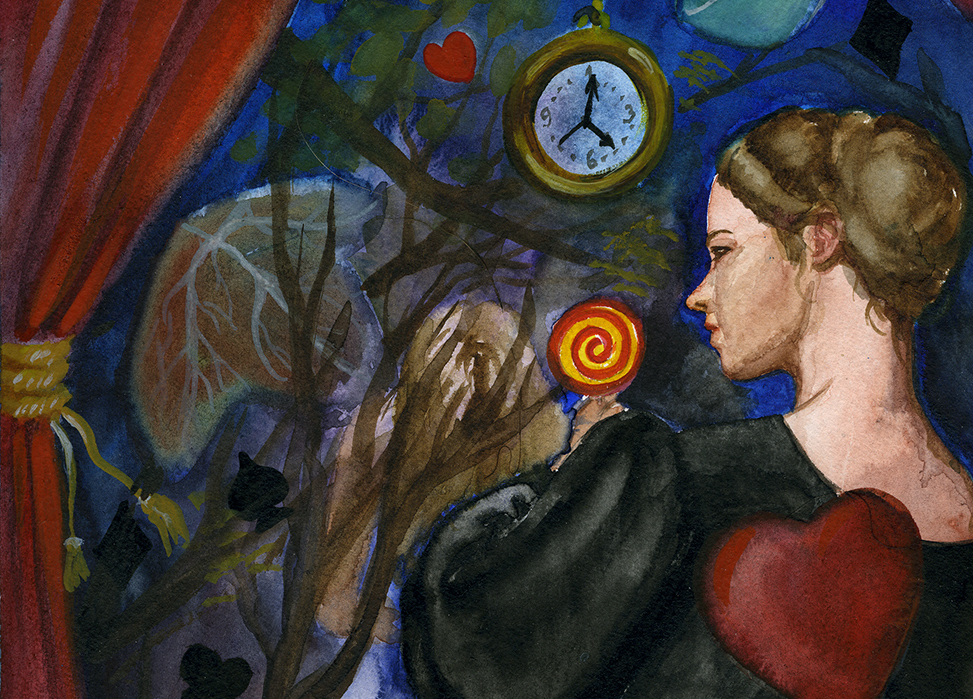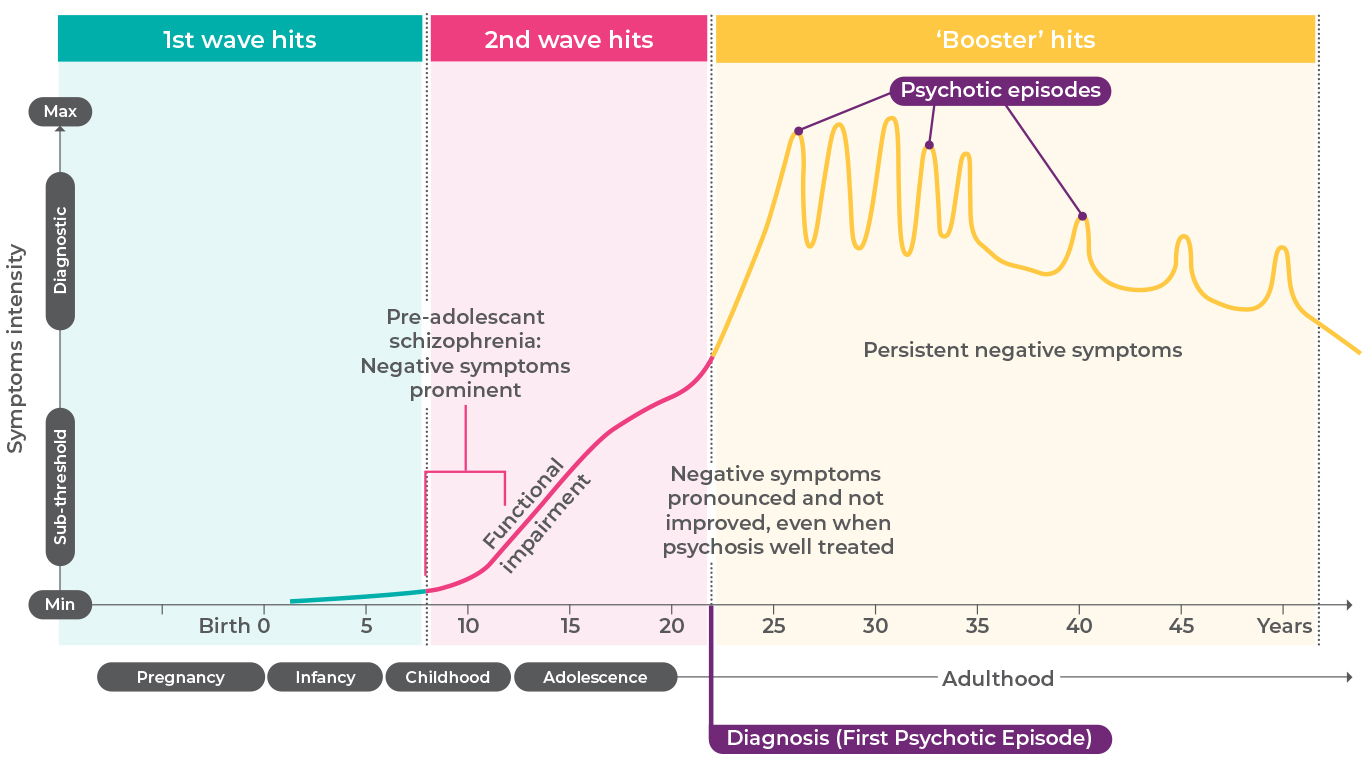People with schizophrenia may present a variety of symptoms, which may impact upon their quality of life.1
These symptoms usually start at a young age, between 16 and 30.2
The doctor will assess the symptoms to perform diagnosis. Today, there are reliable tools for diagnosing schizophrenia, as well as effective medical therapies that can relieve you of the persistent symptoms with low side effects.3
According to the medical community, schizophrenia symptoms may fall into the three core categories below:2
Positive
Negative
Cognitive
What are the positive symptoms of schizophrenia?
People with schizophrenia present positive symptoms when they display unusual behaviours and they feel they are losing touch with some aspects of reality.2 For most people living with schizophrenia these symptoms come and go, but they can persist over time.2 It is also common for these symptoms to remain unnoticed.2 They may include:
Hallucinations: people may see, hear, smell, taste, or feel things that are not real. Hearing voices is common, and this may last for a long time before family or friends notice anything unusual.2
Delusions: people may believe things that are not true. For example, they may believe that they are in danger or that people in their surroundings are talking about them, although this will not be true. 2
Thought confusion: the way they think may seem illogical, and they may have trouble organizing their thoughts. It is not uncommon that they stop talking in the middle of a sentence. 2
Movement disorders: they could exhibit abnormal, or repeated body movements, or they may, at rare occasions, stop moving for a while (catatonia). 2
What are the negative symptoms of schizophrenia?
People with schizophrenia are presenting negative symptoms when they are experiencing social withdrawal and difficulty showing emotions.2 These symptoms, more than the positive ones, can be hard to recognize and can be mistaken for depression or other conditions.2 Experiences could include:
Decrease of emotions and expressions and talking in a dull voice (affect blunted)2,4
Reduced speech, even when there is something important to say (alogia) 2,4
Trouble experiencing pleasure (anhedonia)2,4
Social withdrawal, ignoring daily activities (asociality) 2,4
Lack of motivation, sense of purpose, or ability to follow through on plans (avolition, apathy) 2,4
If a person is diagnosed with schizophrenia mainly characterised by negative symptoms, their doctor will assess whether they are primary or secondary.5 The primary negative symptoms are considered core symptoms of schizophrenia, whereas the secondary negative symptoms are a consequence of positive symptoms.5
The secondary negative symptoms can be a result of:
Neurological side effects, for example extrapyramidal side effects caused by medications, acute dystonia, antipsychotic-induced parkinsonism and difficulty moving 5
Depression, for example, post-psychotic or antipsychotic-induced depression 5
Environmental factors, for example, lack of social stimulation may occur after long hospitalisation 5
What are the cognitive symptoms of schizophrenia?
For some patients the cognitive symptoms of schizophrenia are subtle, but for others, they may be more severe.2 The cognitive symptoms are hard to detect and may require special assessment.2 If a person with schizophrenia presents cognitive symptoms, they may notice:
Poor ability to process information and making decisions2
Trouble focusing on a task2
Problems with their short-term (working) memory2
What is the pattern of the schizophrenia symptoms?
Schizophrenia typically begins with a prodromal period that can last from a few days to 18 months and the person affected may notice deterioration in personal functioning, or memory and concentration problems. 6 The prodromal period is followed by the first episode of psychosis (FEP), expressed with delusions, hallucinations, behavioural disturbances and distress. 6
The FEP is followed by the “residual” phase lasting up to many years, which may be interrupted by recurrent acute psychotic episodes. 6 The acute episodes can be controlled by the proper pharmacological and psychological interventions. 6
This is a brief overview of the schizophrenia symptoms. However, the course of the condition varies considerably from person to person, and one’s symptoms will never be exactly the same as someone else’s.6 Some people may have positive symptoms very briefly, others may experience them for many years, while others may skip the prodromal period. 6
Visit the diagnosis section to find out more about diagnosing schizophrenia.
References
- Arsova S. Open Access Maced J Med Sci. 2016;4(3):388-391
- National Institute of Mental Health. Schizophrenia: https://www.nimh.nih.gov/health/publications/schizophrenia/index.shtml
- National Institutes of Health. Schizophrenia NIH Factsheet 2010: https://report.nih.gov/nihfactsheets/viewfactsheet.aspx?csid=67
- Tandon R. Current Psychiatry 2002;1(9):36-42
- Kirschner M. Schizophr Res. 2017; 186:29-38
- NICE CG 178
- Millan et al. Eur Neuropsychopharmacol. 2014; 24(5):645-92
How long does schizophrenia last?
Because schizophrenia doesn’t develop in a set pattern, the best way to describe the course of the disease is in phases. There are three main phases – a prodrom
more…Can schizophrenia be treated?
After a schizophrenia diagnosis the doctor will have a conversation with the person diagnosed about starting a treatment plan. Once treatment begins, there are
more…




